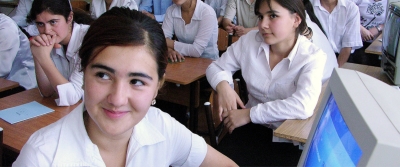 Photo: © Gennadiy Ratushenko / World Bank via Flickr
Photo: © Gennadiy Ratushenko / World Bank via Flickr U današnje vrijeme, biti mlad je pomalo paradoksalno. Nikada do sada svijet nije video toliko tehnoloških ostvarenja, mogućnosti za globalnu mobilnost i pristup obrazovanju. Međutim, danas mladi ljudi na budućnost gledaju izrazito negativno.
Prijevod: Milica Kuzmanović
Vjerojatno prvi put nakon Drugog svjetskog rata mladi ljudi iz zapadne Europe nemaju mnogo razloga vjerovati kako će svijet u kojem će živjeti njihova djeca biti bolji od ovog u kojem oni žive. Međutim, u 21. stoljeću, većina mladih ljudi je rođeno i odraslo u onome što zovemo “Svjetski jug”. Prema podacima UN-a, dvije trećine djece i adolescenata iz Subsaharske Afrike i središnje i južne Azije ne zna čitati) ili ne zna rješiti osnovne matematičke zadatke.
Na svjetskoj razini zabilježen je stalni porast nezaposlenosti među mladima. Nezaposlenost mladih još više produbljuje socijalne nejednakosti između ekonomskih središta i periferije, što dalje pogoršava razmjere mentalnog zdravlja kod mladih, a sve ovo ukazuje na duboku krizu s kojom se suočavaju djeca i adolescenti danas.
Ova kriza je prije svega politička. Ovo je kriza u odnosu na tko i kako donosi odluke. U posljednjih nekoliko desetljeća, sudjelovanje mladih u politici bilo je ozbiljno ugroženo. Iako se radi o "njihovoj budućnosti", mladi u Europi ali i širom svijeta nemaju mnogo što za reći prilikom donošenja odluka koje se odnose na njih. Kategorija ‘mladi’ je depolitizirana, lišena bilo kakve moći, ili je institucionalizirana izvjesnim birokratskim dogovorima, što za rezultat ima prigušivanje autentičnog glasa generacije. U konačnici, politika je učinjena nezanimljivom mladima, te su mladi usmjereni da koriste svoj talenat i energiju baveći se područjima koje ne ugrožavaju sadašnji poredak stvari (status que).

Niz demonstracija koje su se dogodile širom svijeta, poznate kao "Petak za budućnost", predstavljaju kontrast tendenciji opće političke apatije mladih. Od kolovoza 2018. godine, oko 2200 protesta je organizirano od strane studenata. Oni su od političkih lidera zahtijevali da poduzmu akcije u cilju rješavanja kriza koje proizlaze iz trenutnog gospodarskog i industrijskog modela.
Ekonomija, ali i politika i kultura, igraju ključne uloge u izazovima s kojom se mladi Romi danas suočavaju širom Europe. Zbog nejednakog pristupa adekvatnom obrazovanju, diskriminacije od strane dominantnih institucija, i duboko ukorijenjene stigmatizacije romske kulture, mladi Romi su često zapostavljeni i marginalizirani.
Jasno je kako se ovi problemi ne mogu riješiti preko noći. Potrebna je snaga i istrajnost ne samo od strane Roma, već treba ujediniti društvo na jednoj višoj, pa čak i europskoj razini, kako bi se prevladale dugotrajne podjele koje postoje u posljednjom desetljećima, ali jedno glavno pitanje ostaje otvoreno - ohrabrivanje mladih Roma da promijene svoju zajednicu i društvo, te ga učine jednakim drugima po svim osnovama.

Living as a youngster these days is somewhat of a paradoxical experience. Never before, the world has witnessed such a plentitude of technological opportunities, possibilities for global mobility, and access to knowledge. And yet, young people nowadays face an extraordinary lack of positive perspective for their future.
Perhaps for a first time after Second World War, the youngsters in the West have little reason to believe that the world of their children will be better from their own. Most of the young people in 21st century, however, are born and raised in the so-called Global South. In regions such as Sub-Saharan Africa and Central and Southern Asia more than two-thirds of the children and adolescents do not achieve even minimum proficiency in reading and mathematics, according to data from the UN.
Steadily rising youth unemployment on a global scale, deepening social inequalities between the economic cores and the peripheries, and the increasing levels of mental health issues among youngsters around the world all point at the profound crisis the current generation of children and adolescents face.
Indeed, this crisis is first and foremost political, that is a crisis of how and by whom decisions are made. In the recent decades, youth participation has been heavily compromised. Despite being “our future”, youngsters in Europe and around the world have very little say in the decision-making of their communities. The category “youth” has been either depoliticized, i.e. deprived of power, or institutionalized within certain bureaucratic arrangements which results intimately in silencing the authentic voice of the generation. In the final analysis, politics has been made rather undesirable for youngers and they’ve been directed to spend their talent and energy in fields that do not challenge the status quo.

An exception to the general tendency of political apathy was the series of demonstrations around the globe known internationally as the Fridays for Future. Since August 2018, around 2200 strikes were organized by school students in 125 countries. They demanded form political leaders to take action and tackle the environmental crisis emerging from the current economic and industrial set-up.
Economics again, but also politics and culture play a key role when it comes to the challenges Roma youngsters face today around Europe. Due to the lack of equal access to adequate education, the overwhelming institutional discrimination, and the deeply-rooted stigmatization of Roma culture, the Romani young people are often left behind and marginalized.
Clearly, these problems could not be resolved overnight. It takes courage and persistency not only from the Roma communities, but by the entirety of the respective societies, and even on all-European, level to overcome the long-standing divisions in our continent. Without a doubt, thousands of people worked tirelessly for that cause in the last decades, but one main issue remains untouched – young Roma’s empowerment to change their communities and societies on equal basis with everyone else.